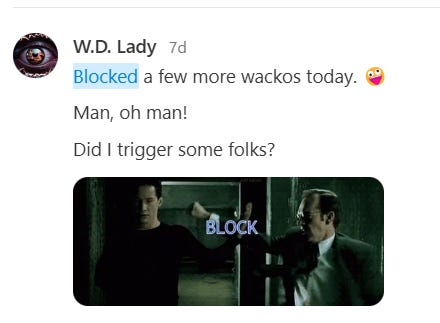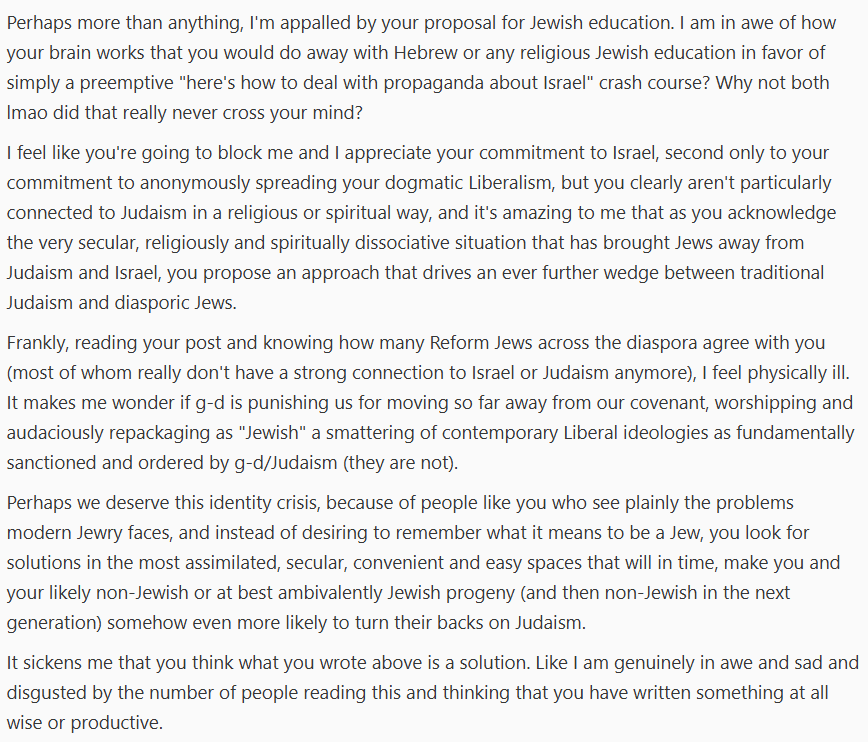
I could start this entry with “I am a strong believer in free speech,” but nowadays that phrase is nothing more than an empty platitude. No one’s right to free speech is unfettered, and we all expect some degree of censorship in our daily lives. That is not my concern here. I wish to discuss the issue of censorship, specifically the type of censorship under our personal control.
I don’t exactly have a huge platform — this little blog of mine with fewer than 1000 followers hardly counts in the grand scheme of wider political commentary. My philosophy boils down to the following: I write for anyone willing to consider my voice and I welcome anyone’s engagement, whether to agree or disagree. Yes, that includes those whose views I find abhorrent. Yes, that includes those whose language and tone I find insufferable.
Any writer discussing issues related to Jews or Israel has dealt with their share of vile trolls spewing antisemitism—this is true in general, but it’s gone next-level in the last year and a half. They throw around the terms “genocide,” “apartheid,” and “evil” to the point they’ve lost all meaning. However, I am willing to deal with them if what I’m doing helps others feel less alone, or if it equips others with the information that they need in this current PR war of ours. And no, I usually don’t “just ignore them.” If they’re going to spew vile misinformation about my people and twist around things I’m saying to mean things they don’t, then they will answer for it.
In what should be a surprise to no one, often the vitriol comes from other Jews. It runs the gamut: I’m not Zionist enough, I’m too Zionist, I’m too liberal, I’m not liberal enough, I talk about Jews too much, I’m not Jewish enough, I focus on the “wrong” kinds of Jews, I’m not sensitive enough to the needs of [insert protected group here]. All of it carries the following connotation: “I demand that you adjust to suit my needs” (like I give a fuck what those are).
For many a Substack writer during these tumultuous times, the block button has become their friend:
People honestly believe that blocking people from reading or engaging with their work punishes (or “triggers”) the blockee. No. You are the one who got triggered, and in the absence of being able to communicate with this person who upset you in any meaningful way, you went to your emotional support block button. It made you feel good for a full second, kind of like you won. It wasn’t necessarily the wrong action to take; just own up to what it is.
The problem is, you didn’t win—all you did was censor them. It might be the right thing to do in certain circumstances (i.e. unceasing harassment), but it’s almost never the best way to deal with someone casually commenting on your work.
I notice nowadays that whenever someone comments with asshole language, it usually includes some variation of “I bet you’re going to block me now. GO RIGHT AHEAD.” They’re daring me to do something I would never actually do. Here’s one example from my recent article about the state of conservative Judaism (it’s an excerpt from a longer diatribe):
I don’t think we need a master linguist to see that regardless of whether or not you agree with this individual’s overall assessment, 1) this comment is extremely rude; 2) accusing me of lacking a connection to Judaism is not as much offensive as it is ridiculous; and 3) this long-winded expression of personal disgust doesn’t actually address the issue at all. But whatever—it’s an open comments section, she has the right to disagree in her own voice, and that’s more or less what I replied.
I’m not going to pretend that none of the venom bothers me—a lot of it does, especially when it comes from other Jews. I write to discuss certain issues and to promote conversation and unity among those who appreciate the gravity of those issues. Of course, we could go back to the fact that I’m just a regular person writing words on a blog. Perhaps we all collectively need to take a chill pill. But I also realize that I’m writing on topics that carry an unusual emotional charge, for both Jews and non-Jews alike.
If you can properly defend your views, there is no need to block or censor your haters. If you are speaking truth, nothing they say or do can stop it from being true. Through truth, we are free. And no asshole on the Internet can take your freedom.







I'll state my priors:
1. Antisemitism is not a logical position that can be defeated by rational arguments.
2. Antizionism is genocidal. (actually genocidal, because it wants to violently remove 50 percent of Jews from their homes)
With those, I see no reason to engage in any nonviolent interactions with anti zionists. My life is more pleasant when I block them and don't see them. What's the advantage of talking to these people? This is not a topic reasonable people can disagree on. There aren't a lot of topics like this, but if you start with the assumption that I should be killed along with my children, then you aren't worth talking to.
I saw that long comment you cite here and was surprised by the level of venom. Kudos to you for not getting triggered. I do block people but I don’t advertise it as an “own.” I do it for my sanity and to keep from getting pulled into interminable debates with unreasonable people. One guy who blocked me eventually took up hours of my time with his insistent debate. I was never so happy to be censored as when he blocked me.